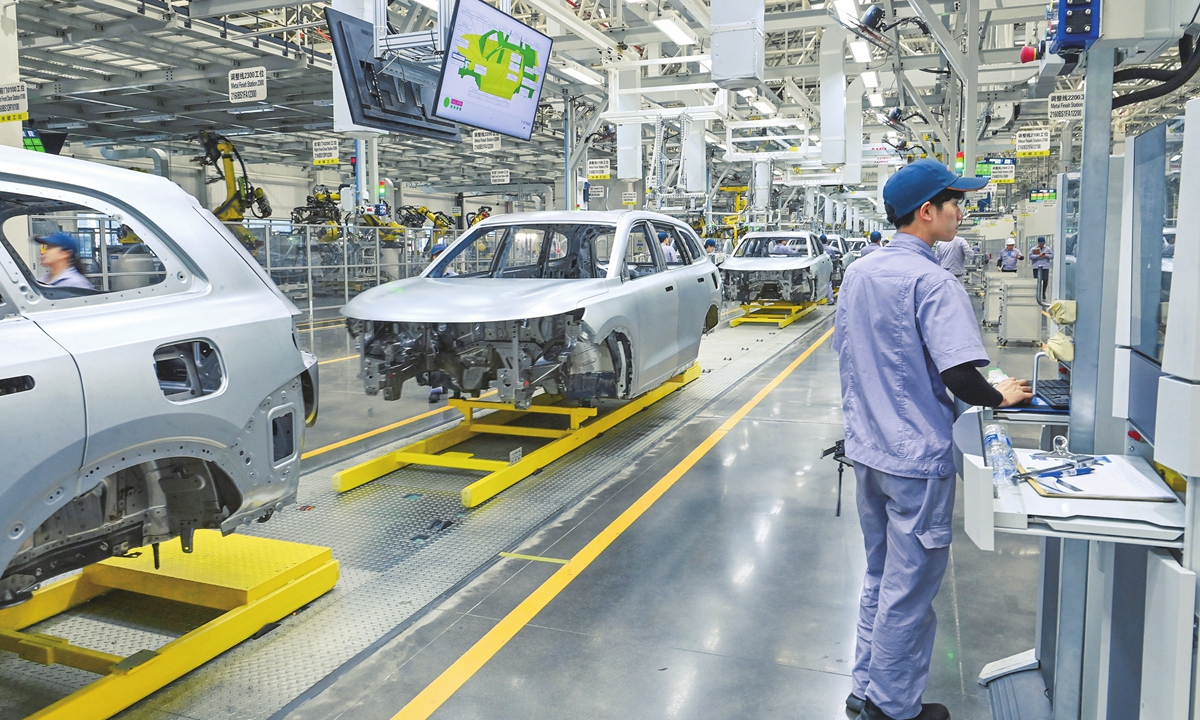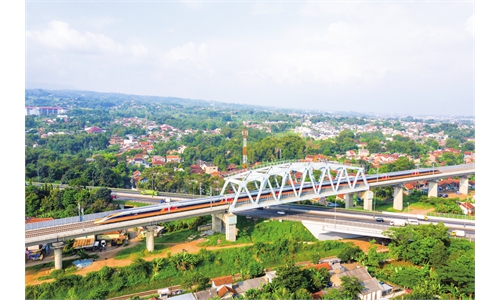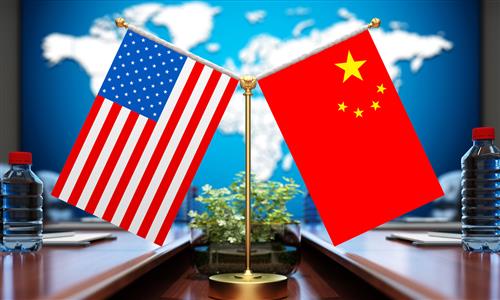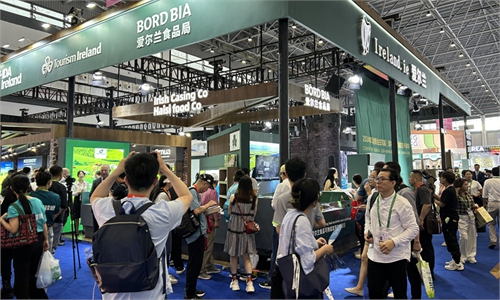'China overcapacity' fallacy exposes Western geopolitical thinking, bad faith mentality


The manufacturing line of a NEV factory in Southwest China's Chongqing Municipality Photo: VCG
Editor's Note:
The current intense negative coverage of the Chinese economy by Western media outlets shows that the US-led West is launching cognitive warfare against the Chinese economy, which remains stable and increasingly resilient in the face of headwinds and challenges.
Although the "China collapse" rhetoric and other fallacies have been debunked, Western media outlets are relentlessly concocting new terms to discredit the Chinese economy from various perspectives.
In response to this coordinated smear campaign, the Global Times is publishing a series of articles to counterattack this drive, specifically addressing the absurd hype about the "lack of transparency in Chinese economic data," "overcapacity in China," and "deflation in the Chinese economy" among others. This is the third installment in the series.
Against the backdrop of accelerating the development of green industries and corresponding economic transformation around the world, China has not only significantly improved its technological and production capabilities in new industries represented by new-energy vehicles (NEVs), lithium-ion batteries, and solar panels, but also increasingly become an important part of the global industrial supply chain in related industries.
However, in this context, some Western political actors and media have recently started a wave of slandering on China with a "overcapacity" narrative. Compared to over one decade ago when the West accused China of "exporting excess production capacity," the current attacks by the West are mainly focused on China's high-tech sectors, which essentially reflects the decline and waning influence of these Western countries in the global marketplace. Therefore, they have resorted to simplistic and conservative tactics, attempting to pressure China by once again labeling the country as having "overcapacity." However, this argument contains obvious logical errors.
First, the demand for global green development is gradually increasing rather than standing still. The current logic premise of the "China overcapacity" accusation is that the demand for products such as NEVs, lithium-ion batteries and solar panels in the international market is already at its peak, ignoring the changes in consumption demand driven by policy trends and technological progress on a global scale, as well as the huge potential of emerging markets and developing countries as part of the energy transition process.
In order to tackle climate change, more than 130 countries and regions worldwide have set carbon peak and carbon neutrality targets. As different countries implement "dual carbon" policies at different stages, the economic effects of green development worldwide will also gradually be released in stages. The world economy's green and low-carbon transformation and the resulting industrial demand is expected to continue to keep growing.
Second, the West has misinterpreted China's capacity expansion as having an "impact on employment" and resulting in "unfair competition." Western politicians and media claim that Chinese companies and related products are unfairly seizing international market share at lower prices, leading to many good jobs related to manufacturing relocated to China, thereby affecting and even hindering the employment and overall development in other countries.
Representative rhetoric includes US President Biden accusing China of "unfair economic practices" in his 2024 State of the Union address and European Commission President Ursula von der Leyen stating that "European leaders will not be able to tolerate that our industrial base is undermined by unfair competition."
The fallacy of this logic lies in deliberately downplaying or even ignoring the changes in international division of labor in the context of globalization and China's positive contribution to the world economy.
In recent years, China's investment and development in emerging fields such as smart manufacturing, clean energy, and information technology are based on the need for its own high-quality development and industrial restructuring, and at the same time promote the optimization and upgrade of the global industrial chain.
The efforts and achievements made by China in these areas are not aimed at "taking away good jobs" from the US or Europe, but rather seeking to reduce its dependence on low-end manufacturing and resource consumption, achieve a shift toward the high end of the global industrial chain value chain. This transformation and upgrading will also play a "catfish effect" globally, helping promote the development of related industries in developed countries.
Third, China's goals and practices in promoting the development of related industries are completely different from the clearly geopolitically motivated operations in the West. The recent emergence of the "China overcapacity" rhetoric also is aimed at further demonizing China's industrial policies.
Although industrial policies have long existed in the US and Europe, Western politicians and public opinion now claim that China's practices are different in nature and scale, trying to depict a picture of "competition between individual Western companies and China at the national level."
The fallacy of this logic lies in ignoring the obvious differences in the starting points of China's relevant industrial policies compared to the industrial policies currently promoted by the US and Europe. China is promoting the development of related industries with the need to focus on its own modernization, while the US and Europe are driven by strong protectionism and even strong geopolitical planning.
More importantly, China continues to adjust its policies within the international free trade framework, striving to achieve a balance between openness and international cooperation. Advanced Western countries such as the US, Japan, and Germany have long had their own industrial subsidy policies, especially in key industries such as automotive and aviation manufacturing.
Currently, the Biden administration's "Inflation Reduction Act" and "CHIPS and Science Act" are both aimed at promoting the development of its domestic advanced technologies and industries through massive fiscal stimulus measures, and both have clear geopolitical intentions aimed at China.
In comparison, while China is achieving high-quality development, it is also continuously promoting higher levels of openness and cooperation, actively participating in economic globalization and the international trade system. These are the objective and rational perspectives that can be used to evaluate China's economic capacities and broader development in various fields.
Fourth, China has always attached importance to consumption and domestic demand-driven development, rather than relying on "exporting overcapacity" to achieve its own development.
The "China overcapacity" rhetoric also claims that China's practice of "supporting producers to expand production" will inevitably lead to "domestic supply-demand imbalance," urging China to pay more attention to promoting domestic consumption rather than exacerbating "overcapacity" through more investment.
This logic deliberately ignores or distorts the efforts China has made in adjusting its own economic structure and responding to changes in the international economic situation.
On the one hand, the emphasis on certain production capacities and significant improvements are not only due to China's subjective planning, but also the requirements posed by economic globalization. China has long been a global manufacturing center and an important hub within the global industrial supply chain, and its industrial structure and development are largely driven by global demand. According to market logic, international demand for Chinese products will of course promote the rapid development and improvement of related production capacities.
On the other hand, China's development of production capacity emphasizes the decisive role of market mechanisms in resource allocation, and macroeconomic regulation is often only carried out when necessary. In order to adapt to changes in the global economic situation and China's own economic development needs, China is accelerating the construction of a new development pattern with the domestic circulation as the mainstay and domestic and international circulation mutually reinforcing, while emphasizing a shift from investment and export-driven to a more consumption and domestic demand-driven model.
This all reflects the innovation of China's economic development model, and it is believed that Western companies will also receive development opportunities resulting from China's high-quality development.
By debunking these obvious fallacies, it can be seen that the hype about "China overcapacity" is largely a narrative mixed with geopolitical thinking from some Western countries to cover up their own protectionist operations. Discrediting China's efforts to improve the quality and efficiency of its production capacity also exposes the "sour grapes" mentality of some Western countries that are relatively behind in the race of emerging industries.
Fortunately, in the current struggling recovery of the world economy, China's contribution to global economic development will only be increasingly recognized and appreciated.
The author is research fellow with Guangxi Academy of Social Sciences. bizopinion@globaltimes.com.cn



